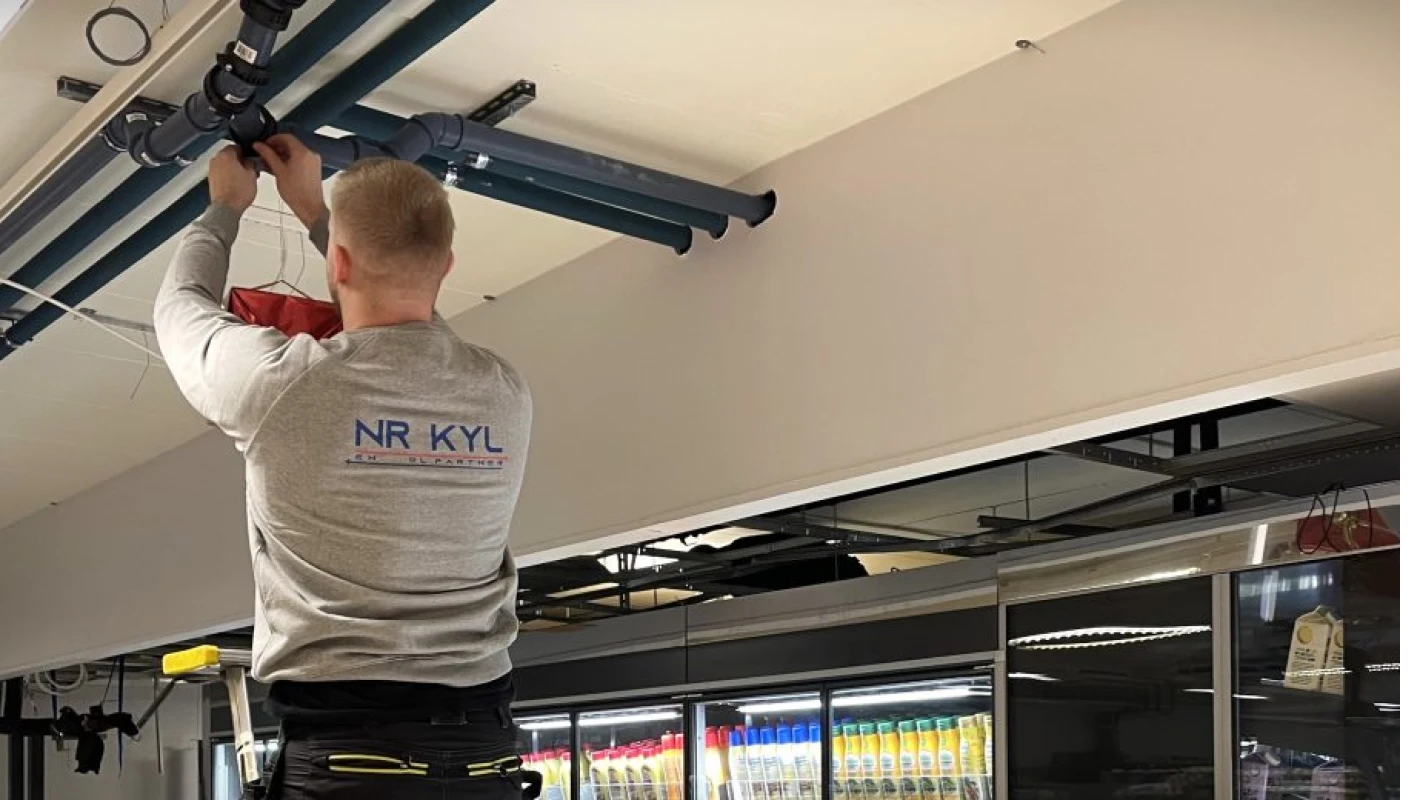NR Kyl AB, a certified Kiona Partner, operates in Gothenburg and was founded in 2012. They aim to promote sound cooling technology with climate-wise refrigerants in grocery stores, restaurants, and buildings.
"We have service teams that carry out repairs and service on existing facilities and installers that build new facilities and rebuild when stores need to update and invest in more modern refrigeration systems," says Emil Sundgren, Service Manager at NR Kyl AB.
Avoiding downtime and food waste
Monitoring and measuring refrigeration systems is crucial to avoid refrigeration downtime and food waste.
"Alarms can go either to an alarm center or directly to us," says Emil. "We will then call the grocery store and give a recommendation on what they need to do.
Tip:
When an alarm comes in from the alarm center, he assesses what needs to be done, writes service orders, and outsources the job to the refrigeration technician who is most suitable for the job. He is also responsible for planning the preventive maintenance of the stores' refrigeration systems.
Digital surveillance
The IWMAC system is used to monitor connected grocery stores around the clock. Refrigeration technicians can easily prevent and adjust faults remotely by installing sensors and setting parameters for temperature, pressure, effect, and opening ratio.
"This allows us to provide a very high level of service to our customers and help them reduce food waste, unnecessary disruptions, and lower energy consumption," says Emil.
With IWMAC, I can show temperature graphs, such as how much cooling is required for open counters versus refrigerated counters with doors. It's easy to visualize this for the customer and show what happens at various temperatures and what difference it can make to their energy consumption.
"Today, energy efficiency and optimization are essential for the customer to stay on top of. Each measurement provides information on how the counter, room, or fridge works; you don't have to be on-site to see it. This results in lower on-call costs because you can immediately see if action is needed or if it can wait. It also provides information on how to optimize consumption, saving both time and money."
From freezing and cooling to heating
Goal 12: Responsible consumption and production
Another important part of IWMAC is forecast control and heat recovery. Through adjustments, grocery stores can harness the excess energy from refrigerated counters and convert it into heat.
"Most cooling systems are equipped with heat recovery. This means the energy can heat the store and hot water instead of being cooled on the roof. This reduces the need to buy electricity from the grid and provides a better operating economy." Emil says that as many as 75-80% of customers use the surplus energy from their cooling systems.
IWMAC also has functions for self-monitoring and HACCP food quality control.
"The establishment's owner is responsible for ensuring that the food the consumer purchases is safe. This means that you have to keep track of whether there are deviations from what is normal. With the help of digital monitoring, we can see the history and assess whether something is wrong," says Emil.
Customer focus
Emil believes that by knowing the customers' business and understanding their challenges, NR Kyl can offer tailored solutions and reliable service.
Older refrigeration systems can mean that it is more difficult to solve the problem and that refrigeration technicians must go out several times. The customer needs to understand why.
"It's a bit like an old car that can't be driven – one time, it's a faulty spark plug, and the next time, it could be a broken fan belt. Having digital monitoring means we can be proactive and work with preventive maintenance so that the customer gets safer and smoother operations."

Dare to charge for knowledge
It used to take a long time to fix faults in a refrigerated counter. Today, however, the refrigeration industry has other challenges, mainly the ability to recruit and retain competent staff.
"For the general public, the refrigeration sector is not as well-known as other professions such as electricians, plumbers, and painters. This creates a challenge in attracting talent and ensuring a stable workforce."
"Another challenge is the lack of training opportunities in refrigeration technology. The increasing demand for qualified personnel has led to competition for skills and increasing wage demands. That means we must have the courage to charge for the time spent."
For our customers, it is about sleeping well at night, knowing that their stores have good food safety, good product quality, and minimal food waste. Stores that have invested in surveillance have definitely saved money.
He points out that the choice of refrigeration supplier is important.
"You must have the courage to make demands and choose someone with high competence and a good reputation within the trade community. Although many customers look at the price, the cheapest is rarely the best in the long run," he says.
Advising, monitoring, and recommending refrigeration systems has improved efficiency and reduced food waste for many customers. This has been made possible by NR Kyl's early embrace of new technology and its integration with advanced digital monitoring.
Interested in how our partner program works? Check out our solutions for Partners!
